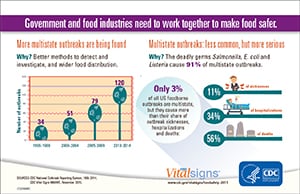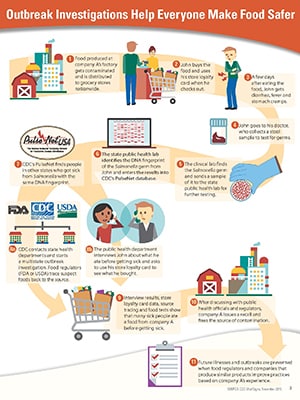Multistate outbreaks cause more than half of all deaths in foodborne disease outbreaks despite accounting for only a tiny fraction (3 percent) of reported outbreaks in the United States, according to a new Vital Signs report released today. Recent outbreaks of foodborne illness linked to tainted cucumbers, ice cream and soft cheeses show the devastating consequences when food is contaminated with dangerous germs before it reaches a restaurant or home kitchen.


The Vital Signs report recommends that local, state, and national health agencies work closely with food industries to understand how their foods are produced and distributed to speed multistate outbreak investigations. These investigations can reveal fixable problems that resulted in food becoming contaminated and lessons learned that can help strengthen food safety.
The report highlights the need for food industries to play a larger role in improving food safety by following best practices for growing, processing, and shipping foods. In addition, food industries can help stop outbreaks and lessen their impact by keeping detailed records to allow faster tracing of foods from source to destination, by using store loyalty cards to help identify what foods made people sick, and by notifying customers of food recalls.
CDC’s Vital Signs report addresses a single, important public health topic each month. The November edition focuses on multistate outbreaks of foodborne disease. These outbreaks frequently cause serious illness in people. In collaboration with our federal and state public health partners, we are finding more of these outbreaks because of improvements in disease surveillance and testing. To stop outbreaks and make food safer, food industries and government must work together to prevent them.
Visit the Safer Food Saves Lives Vital Signs Web page to find the research article from the Morbidity and Mortality Report (MMWR), fact sheet, and other materials.
IUFoST Scientific Information Bulletin (SIB)
FOOD FRAUD PREVENTION